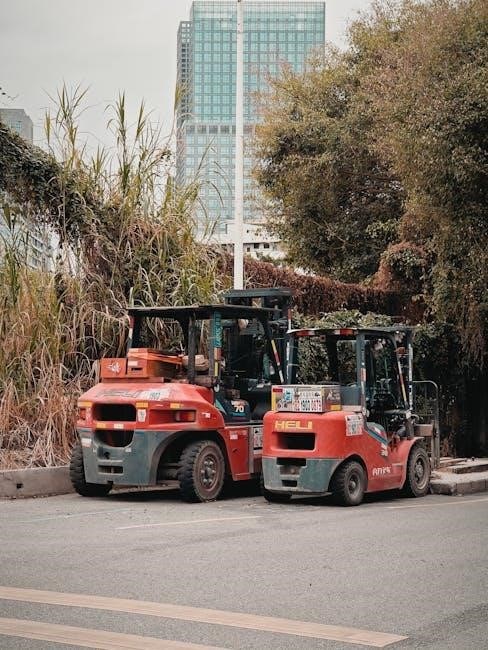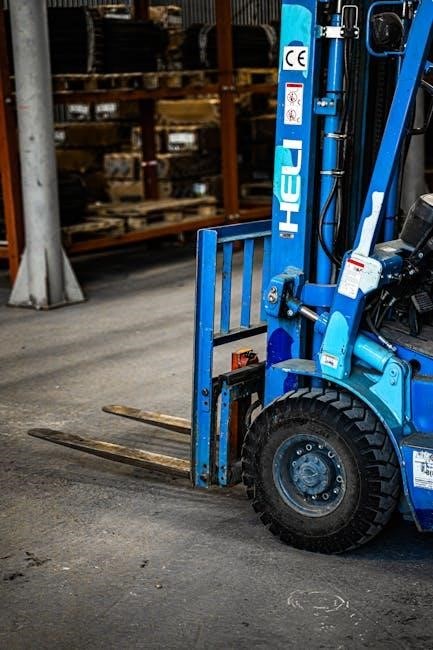Yale Forklift Manual: A Comprehensive Guide
Welcome to your comprehensive guide to Yale Forklift manuals! This resource provides valuable information for owners, operators, and technicians. This guide offers insights into the various manuals available for Yale forklifts.
Yale forklifts are designed for diverse applications, from indoor warehouse settings to rugged outdoor terrains. Models like the ERP040 electric series excel indoors, offering compact efficiency. For outdoor tasks, the Yale KDP18-50UX handles rough conditions with its all-terrain capabilities. Selecting the right model depends on the specific operational environment and requirements. Yale forklifts come equipped with safety features, including overhead guards, seat belts, and safety lights to help keep operators safe during use, which is why these forklifts are some of the best for the job.

History of Yale Forklifts
Explore the rich history of Yale forklifts, tracing their evolution from Yale and Towne Manufacturing Co. in 1868. Discover their expansion from locks to innovative material handling equipment over the decades.
Early Beginnings and Expansion into Material Handling
Yale’s journey began in 1868 as Yale and Towne Manufacturing Co., initially focused on locks with pins; The company strategically expanded its production to include loading and unloading equipment, marking its entry into material handling. By 1920, Yale introduced battery trolleys with lifting platforms, followed by cars and trucks with lifting mechanisms. This diversification cemented Yale’s position in the burgeoning forklift industry, paving the way for future innovations and growth in the sector.
Yale’s 140-Year Legacy of Innovation
Yale Materials Handling Corporation boasts a 140-year legacy of crafting cutting-edge handling equipment. Synonymous with reliability and high productivity, Yale has consistently demonstrated a commitment to technological innovation. This enduring dedication has positioned Yale as a leader in the material handling industry. Their commitment to progress ensures Yale forklifts continue to meet the evolving needs of diverse applications, while maintaining standards for performance and safety. Yale’s legacy reflects the company’s pioneering spirit and impact on the forklift industry.

Types of Yale Forklift Manuals
Yale offers various forklift manuals to cater to different needs. These include service manuals for repairs, parts manuals for component identification, and operator’s manuals for safe operation guidelines and this comprehensive set ensures proper usage.
Service Manuals
Yale forklift service manuals are essential resources for technicians and mechanics. These manuals provide detailed instructions and diagrams for troubleshooting, repairing, and maintaining Yale forklifts. They contain information on various systems, including the engine, transmission, hydraulics, and electrical components. With exploded views, step-by-step procedures, and diagnostic codes, service manuals enable efficient and accurate repairs, ensuring the forklift operates at peak performance. These comprehensive guides are indispensable for anyone involved in the servicing and upkeep of Yale forklifts, promoting longevity and minimizing downtime.
Parts Manuals
Yale forklift parts manuals are crucial for identifying and ordering the correct replacement parts. These manuals contain detailed diagrams and illustrations of every component, along with their corresponding part numbers. Parts manuals are vital for maintenance and repair work, ensuring that the correct parts are used for specific forklift models and years. Having access to the right parts manual streamlines the ordering process, reduces the risk of errors, and helps keep Yale forklifts in optimal working condition. These are essential for efficient maintenance operations.
Operator’s Manuals
Yale forklift operator’s manuals are essential for safe and efficient operation. These manuals provide detailed instructions on how to properly use and maintain the forklift. They include safety guidelines, operating procedures, and pre-operation checklists. Operator’s manuals are crucial for training new operators and ensuring compliance with safety regulations. These manuals contain necessary information for the safe and proper use of the Yale forklift. They also offer guidance on troubleshooting common issues. Proper adherence to these manuals helps prevent accidents and extends the life of the equipment.
Finding the Right Manual for Your Yale Forklift
Locating the correct Yale forklift manual is crucial. Identify your specific model and serial number to ensure you obtain the appropriate documentation. Online resources can assist in finding and downloading the correct manual.
Identifying Your Forklift Model and Serial Number
To locate the correct Yale forklift manual, identifying your forklift’s model and serial number is essential. This information is typically stamped on the nameplate of the forklift. The nameplate provides crucial details needed to access the correct manual. Understanding the model and serial number ensures compatibility with the manual’s contents. Consult the manual’s introductory sections for diagrams illustrating the location of the nameplate. This ensures accurate identification, necessary for sourcing service, parts, or operator manuals specific to your Yale forklift.
Online Resources for Manual Downloads
Finding Yale forklift manuals online is easier than ever, thanks to various digital resources. Official Yale websites often offer downloadable manuals, requiring model and serial number verification. Independent online platforms specialize in equipment manuals, providing access to a wide range of Yale forklift documentation. Some manufacturers may offer PDF collections of parts, service, and workshop manuals for older and newer Yale models. These resources often provide instant access through high-speed download links. Remember to verify the credibility of the source.

Content of a Typical Yale Forklift Manual
A typical Yale forklift manual includes essential safety guidelines, operational instructions, and detailed maintenance procedures. These manuals also provide schedules for regular upkeep, ensuring safe and efficient forklift operation and longevity.
Safety Guidelines and Operational Instructions
Yale forklift manuals prioritize safety, offering comprehensive guidelines for operation. These instructions cover pre-operation checks, safe load handling, and adherence to site-specific regulations. Operators can find critical information regarding speed limits, pedestrian awareness, and proper use of safety features like seat belts and overhead guards. The manuals also outline procedures for avoiding common hazards and responding to emergencies, ensuring a safe working environment. Following these guidelines helps minimize risks, prevent accidents, and extend the lifespan of the equipment, contributing to a safer and more productive operation overall.
Maintenance Procedures and Schedules
Yale forklift manuals provide essential maintenance procedures and schedules critical for optimal performance. These guides detail routine inspections, lubrication points, and fluid level checks to prevent breakdowns. Scheduled maintenance tasks include filter replacements, hose inspections, and brake adjustments, ensuring all components function correctly. Manuals offer step-by-step instructions for performing these tasks, alongside recommended intervals to maintain peak efficiency. Regular adherence to these schedules can significantly extend the forklift’s lifespan. It can also reduce costly repairs. Proper maintenance enhances safety, reliability, and overall productivity, making it an indispensable aspect of forklift ownership and operation.
Yale Forklift Maintenance and Longevity
Maintaining your Yale forklift is critical to extending its lifespan. Regular maintenance ensures optimal performance and minimizes downtime. This section will explore factors affecting forklift longevity and the importance of consistent maintenance.
Factors Affecting Forklift Lifespan
Several factors influence the lifespan of a Yale forklift, including operating environment, usage intensity, and maintenance practices. Harsh conditions, such as rough terrains or extreme temperatures, can accelerate wear and tear. Overloading and improper operation can also reduce lifespan. Regular inspections, timely repairs, and adherence to maintenance schedules are crucial for maximizing a forklift’s operational life. The operational hours are also a critical component of the lifespan. With proper maintenance, a Yale forklift can last for many years.
Importance of Regular Maintenance
Regular maintenance is paramount for ensuring the longevity and optimal performance of your Yale forklift. Scheduled maintenance helps prevent costly breakdowns, extends the lifespan of the equipment, and maintains safety standards. Proper maintenance includes checking fluid levels, inspecting tires, lubricating moving parts, and addressing any mechanical issues promptly. Consistent maintenance also enhances the forklift’s resale value and ensures compliance with safety regulations. By following the recommended maintenance schedule in the Yale forklift manual, you can significantly improve its reliability and reduce downtime.

Safety Features in Yale Forklifts
Yale forklifts prioritize safety with features like overhead guards, seat belts, and safety lights. These elements are integral to protecting operators and ensuring a secure working environment.
Overview of Safety Components
Yale forklifts are equipped with several safety components designed to minimize risks and protect operators. These include overhead guards that shield the operator from falling objects, seat belts that secure the operator in place, and safety lights that enhance visibility in the workplace. The integration of these components reflects Yale’s commitment to creating a safer environment for material handling operations. Regular inspection and maintenance of these safety features are essential for ensuring their effectiveness and the overall safety of the forklift operation. Operators are encouraged to familiarize themselves with all safety features before operating the equipment.
Operator Training and Safety Protocols
Operator training is paramount to ensuring safe and efficient forklift operation. Yale provides comprehensive training programs that cover safety guidelines, operational instructions, and maintenance procedures. These programs equip operators with the knowledge and skills necessary to operate forklifts safely and effectively. Adherence to strict safety protocols, including regular equipment inspections and adherence to load limits, is critical for preventing accidents and injuries. Proper training and consistent implementation of safety protocols are essential for maintaining a safe working environment and maximizing the longevity of Yale forklifts. Safety must be a priority.